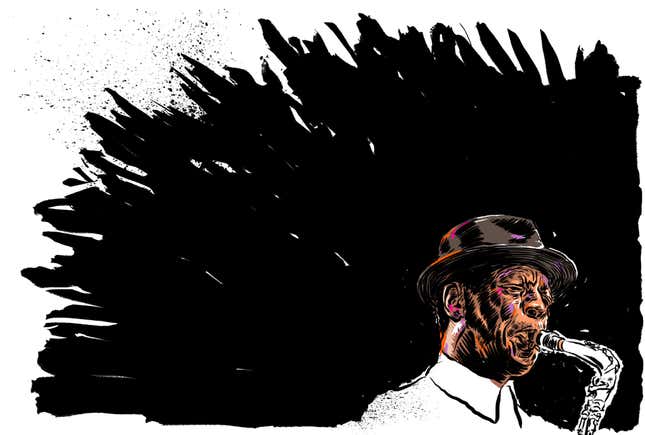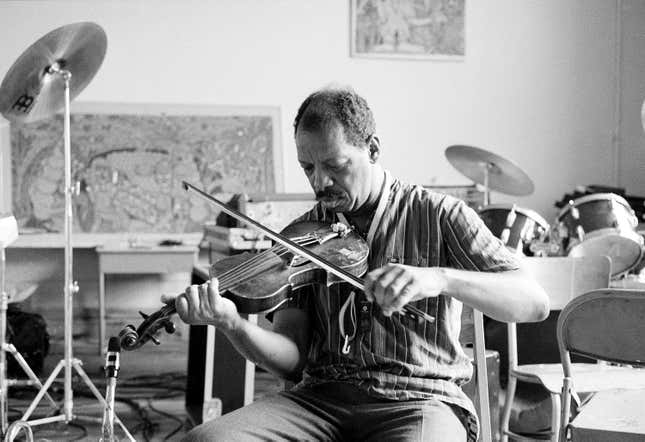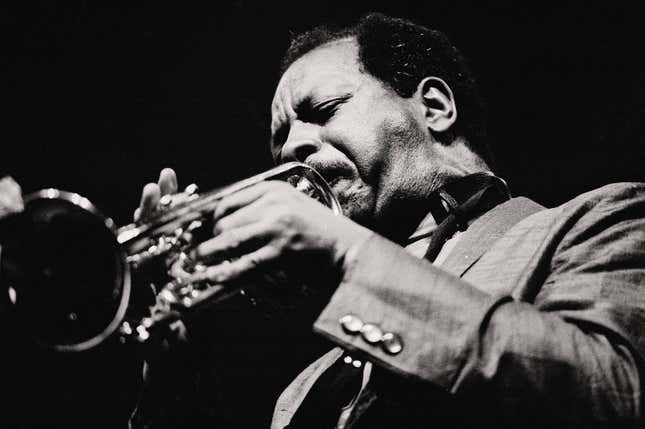
On a warm, cloudy afternoon in June, Ornette Coleman and I walk from 9th Avenue to his condo on West 36th Street. I’m in New York so we can play some duets.
I love Ornette and his music, but my interest in playing with him is only a career move. I’ve been out of the music business a long time, and it seems advisable to start back in good company.
Ornette has in recent years become very wealthy, after having long since been very famous. Old age has turned him into a hot property once again; in the past year or so he has won a Pulitzer and a Grammy.
He owns the penthouse of a pre-war building, with a private elevator that goes up to his floor, opening onto a loft-like living area. It’s impressive: a few thousand square feet, branching out in one direction onto a small rehearsal room and in another toward the darkened recesses of the bedrooms. A high-tech kitchen is incorporated into the open space. The wall that overlooks 36th Street consists of 14foot floor-to-ceiling windows. The bare hardwood floor is polished to a high gloss. The place doesn’t look like the home of a jazz musician.
Sparsely furnished and decorated, every piece of furniture and work of art counts. There are big modern sculptures, some large, boldly colored paintings (one of which is on the cover of Ornette’s album Dancing in Your Head), and a Warhol original.
In Ornette’s practice room, there’s also a wall-sized blowup of the notorious Viet Nam era photo of Nguyễn Ngọc Loan’s point blank pistol execution of a Viet Cong prisoner. It’s what we see whenever we rehearse together—what Ornette sees every day he’s home. I don’t find the blowup conducive to creative improvising; maybe Ornette does. But, as a recognizably gentle man, it’s hard to imagine his seeing someone being shot in the head filling him with exuberance.
Ornette hates his condo. He’s convinced his neighbors in the building don’t like black people. He’s afraid that someone is breaking into the place and stealing things, breaking things.
I’ve met some of his neighbors while waiting for the elevators in the lobby. Far from not liking Ornette, they all seem awed and flattered to share an address with him. And given the security in the building, the coded elevator, and the various locks to Ornette’s door, it’s unlikely that anyone is sneaking into his apartment to steal or vandalize. Whenever I come to see him, everything is in exactly the same place as the time before.
Ornette and I talk about a youngish vocalist with whom he’s performed and whose career he wants me to take over. She’s not good, so her career can only go as far as her association with Ornette allows it. On her own, she’ll go nowhere.
“You know, I slept in the same bed with her once,” Ornette says. His voice is high pitched and very quiet. He’s a small, frail man, made yet frailer by age. He has a slight lisp and the hint of a Texas accent. “I don’t remember if we had sex.” He pronounces it “thex.”
“That means you’re either getting fucked a lot or you never get fucked.”
He laughs.
“Yeah. I suppose I ought to remember whether I fucked her or not. But I worry about whether I’ll get some woman pregnant. I think there are women around who want me to get them pregnant. That’s why I almost never have sex. I don’t remember the last time I had sex.”
“So if you fucked her, you’d probably remember it. Do you remember what her body looked like?”
He ponders that one. “I think I remember. Yeah, yeah, I’m pretty sure I’ve seen her naked.” That comes out “nek-kid.”
“I hope for your sake that you have. Because she can’t sing at all.”

Photo by Mario Suriani, via AP
Ornette has obsessive and circular theories about music. Certain numbers and relationships travel around insistently in his head. They trouble him, I think.
These theories have been called “harmolodic”—a publicist’s term generated to suggest a complex system of logic—but they’re actually just a combination of abecedarian music rules, the substitution of visual relationships for intervallic ones, and misapplied and inaccurate information regarding the inherent pitch of various instruments. (Ornette thinks that the bass, for example, is an E-flat instrument.) All this goes along with Ornette’s unquestionable genius, for the ways that music might be put together. If harmolodic theory is at best naïve and at worst gibberish, it does open a window onto one type of untutored brilliance, a kind of savantism that endlessly repeats certain relationships and patterns.
“Okay,” he whispers in his papery voice, “you play the piano. That’s in C, ain’t it? So I play my A on alto and that’s the same C. The trumpet player play his D, but that sound the same too. Then the bass player—he in the bass clef, ain’t that right?—he play his E-flat, and that come out C too. So all these notes got different names, but they all the same sound. How is that possible? Or like they all got the same name, like if we all play C, but we got four different notes. So why we using these names? That’s fucked up. See, a sound don’t care what you call it. It just a sound.”
Some of this is right. Some of it is wrong. I couldn’t understand why he thought the bass—a concert instrument—was pitched in E-flat. Then I figured it out: Ornette looked at where the note for C was placed in the bass clef. It corresponds to the treble clef’s A natural—suggesting in an incorrect way that the bass is an E-flat instrument.
Ornette is terrified of dying before he’s had a chance to express through his music what he feels he must. He doesn’t know what that music would sound like. He thinks that his new music must be “spiritual” but doesn’t attach a compositional or improvisational blueprint to it.
So he’s stuck. His language, although both innovative and expressive, is restricted. He’s been famous for a long time, but he’s a strangely primitive player. Both his fame and his primitivism restrict him. He’d have to move outside what he knows in order to play a new way.
More significantly, he’d have to move outside his fame. Anyone famous who radically changes his voice does so at great peril.
This isn’t going to happen. I’ve now played with him quite a bit, both of us trying to reach some shared place where dialogue can be spontaneous, expansive, and honest. Ultimately, he always plays exactly the same way.
People ask me, “What’s it like to play with Ornette?” I tell them that there are more things he can’t do than things he can. But he can play the shit out of Ornette Coleman music.
This is no small thing. Ornette Coleman is a great original. Because much of his fame has mostly come through the adulation of white, educated jazz cognoscenti, there’s a reluctance to allow him his genius without plastering on a lot of academic embellishment. Following Charlie Parker, jazz innovators must almost by definition be both abstract and abstruse. It might thus be considered sacrilege to lump Ornette in with other untutored geniuses like Robert Johnson or Blind Lemon Jefferson. But those comparisons aren’t entirely inaccurate. Ultimately he winds up embedded with guys like John Coltrane and Cecil Taylor—players he bears virtually no connection with. This failure to take him on his own terms denigrates Ornette. It also forces him into talking a kind of gibberish that should be unnecessary.
Make no mistake; in spite of what Ornette Coleman can’t do, what he does do has unearthly beauty. Hearing it from a distance of two or three feet—attempting to negotiate and contribute to it—is a monumentally moving experience.
Much of our duet playing is terrible. Because I’m not interested in being Ornette’s accompanist (and, in fact, walked out of our first quartet rehearsal with bassist Henry Grimes and drummer Jim Schapperoew for that reason), or in playing the obvious or redundant, I struggle to find a compatible voice that compromises neither of us.
We’ll play unproductively for half an hour. Then something will click into gear, some sonic lever will get tripped. The first time that happened, it was when I realized that I was playing with someone who was both a blues musician and, although his hometown of Fort Worth is toward the northern part of the state, a border musician. I understood that I’d do better by playing through a prism of Texas musical history (things that Ornette might have heard throughout his early life—things that defined him as a man) than by thinking in terms of form or structure.
I tried it, and Ornette immediately responded. For the next 45 minutes, we played music that was eerie, full of screams and wails, moving way back obliquely to packed Texas juke joints from the 1920’s but then rocketing into the future. It was more Ornette’s music than mine (since I was using him as the emotional fulcrum on which the music could balance), but there was a profound communication.

Photo by Matias Nieto, via Getty
This afternoon Ornette wants to hear my CD Glossolalia, a duet I recorded in London with British saxophonist Evan Parker. Both Ornette and I are incompetent when it comes to anything electronic, so we wind up crawling around the floor trying to hook up various CD players and speakers. Finally we go to the bedroom and play the CD through the DVD player built into his television set.
Ornette listens for a couple of minutes. He doesn’t like Evan’s approach.
“He’s playing notes. He’s just following you, playing with his hand close to the keys on the saxophone. What you playing is an idea. It ain’t notes. People need to hear this. You need to record a solo album. I should try playing it. We should record together.”
He insists that we try to play what he’s just heard on the CD. I disagree with him about Evan Parker’s playing. Evan plays with complete understanding of what I’m doing. It’s true that he’s more reactive than instigative, but that works because Evan’s response time is so quick, his technique so extraordinary, and his ear so uncannily attuned to whatever he hears. I don’t think Ornette will negotiate the music as successfully.
We begin to play and, although it’s interesting enough, Ornette’s alto veers off quickly toward familiar territory. It’s good music, but it’s good on Ornette Coleman terms, and that’s what neither he nor I wanted.
After 20 minutes, we stop.
“Did I get it? Did I do it right? Did I sound good?”
“Well, you know. You always sound great. It’s just a different approach.”
“Let me try it again. I think I can get it.”
I have to be at the award dinner soon, and so try to beg off. But Ornette is intent on trying to making his saxophone cohere to this style of playing, which is based on one uninterrupted line—a kind of wash of patterned sound. And I think to myself, “I’m trying to talk Ornette Coleman out of playing with me. Am I out of my fucking mind?”
“C’mon, Charles. Just one hour.”
We play another 40 minutes or so. It’s the same. The music has value, is in fact very good in spots, but doesn’t represent a truly different approach for Ornette. He simply adds his playing to mine. I deliberately refrain from accommodation, since the purpose of the exercise is to hear whether Ornette can play effectively within the context of the CD he’d just heard. I also inadvertently break his piano, busting the D natural next to middle C by hitting it too hard. Ornette is actually more impressed than upset by that.
We finish up, hug goodbye, and I get set to leave.
“I’ll get it,” Ornette says. “We just got to play a lot more.”
I don’t think he’ll get it. But he’s gotten a lot of other things. In spite of the limited success we’ve had finding common ground—our voices are not naturally complementary—there are those moments of telepathy that produce unsettlingly powerful music. As I get into the cab, it hits me, not for the first time, that this guy has just won the Pulitzer Prize. No one else has ever played like Ornette and yet, somehow, largely on his own terms, he’s brought the world to his music.
Charles Farrell has spent most of his professional life moving between music and boxing (with a few detours along the way). He has managed five world champion boxers and has 30 CDs listed under his name. Farrell is currently at work on a book of essays about music, boxing, gangsterism, and lowlife culture; a boxing anthology edited by Mike Ezra and Carlo Rotella; and a TV series, Red House, based on events from an earlier part of his life. He can be found on Twitter at @cfarrell_boxing.
Illustration by Jim Cooke